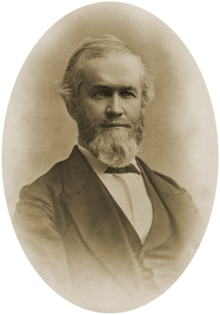John Brown Baldwin
John Brown Baldwin (born January 11, 1820 in Staunton , Virginia , † September 30, 1873 ibid) was an American lawyer , politician and officer. The Congressman Alexander Hugh Holmes Stuart (1807-1891) was his brother.
Life
John Brown Baldwin, son of Martha Steele Brown (1791-1870) and Briscoe Gerard Baldwin (1789-1852), was born in Staunton about six years after the end of the British-American War . Nothing is known about his youth. Baldwin graduated from Staunton Academy and graduated from the University of Virginia in 1838 . He studied with his father Jura and started after receiving his admission to practice as a lawyer, first as a partner of his brother Stuart and three years later in his own firm. He was a Whig Party member at the time. In 1845 he was elected to the Virginia House of Representatives, but suffered a defeat in his re-election the following year to Hugh W. Sheffey (1815-1889), another member of the Whig Party. The economic crisis of 1837 and the subsequent Mexican-American War overshadowed his student days and the years that followed. On July 4, 1852, he married Susan Madison Peyton (* 1822), daughter of the prominent lawyer John Howe Peyton (1778-1847). The marriage remained childless. Between 1856 and 1864 he was a member of the Board of Visitors at the University of Virginia.
After the Whig Party dissolved, he joined the Constitutional Union Party . In the presidential election of 1860, he campaigned for votes for John Bell (1797-1869). He was elected to the Virginia Civil Secession Convention in February 1861 during the Secessionist Crisis. On April 4, 1861, he represented the unionists who attended the meeting in an hour-long meeting with President Abraham Lincoln (1806-1865) in the White House . It was hoped then that an agreement could be reached that would keep the peace and keep Virginia in the Union . Baldwin, however, returned to Richmond empty-handed when he and Lincoln discovered that they had talked past each other.
After the Virginia secession, Baldwin felt it was his duty to remain in his home state. After the outbreak of the civil war , he enlisted in the Confederate Army . He served as a Colonel in the Virginia 52nd Infantry until poor health forced him to resign. In November 1861 he was elected as a delegate for Augusta County to the first Confederate Congress, where he took up his post on February 18, 1862. He ran successfully for the second Confederate Congress in 1863 , defeated the incumbent Governor John Letcher (1813-1884) and worked there until the end of the Confederation in 1865. Between sessions Baldwin acted as a Colonel in a regiment of Augusta Reserves.
After the surrender of General Robert E. Lee (1807-1870) at Appomattox Court House , Baldwin worked towards peace. Under the new post-war government he was elected to the Virginia House of Representatives in 1865, where he was elected Speaker . During his time in the General Assembly , he sat on the Committee of Nine, which helped develop a constitution without strict restrictions on authority and the right to vote. This allowed Virginia to be re-admitted to the Union in 1870. Baldwin died in Staunton in 1873 and was buried there in Thornrose Cemetery .
Web links
- John Brown Baldwin in the database of Find a Grave (English)
- John Brown Baldwin at The Political Graveyard
- John Brown Baldwin on the Encyclopedia Virginia website
- John Brown Baldwin on the johnhowepeytonestate.org website
- John Brown Baldwin on the website of http://valley.lib.virginia.edu
Individual evidence
- ^ John Howe Peyton in the Find a Grave database . Retrieved January 14, 2015.
- ↑ The Confederate States almanac and repository of useful knowledge: for the year 1863 , Gale Cengage Learning, ISBN 9781432804930 , p. 33
| predecessor | Office | successor |
|---|---|---|
| Hugh White Sheffey |
Speaker of the Virginia House of Representatives 1865–1869 |
Zephaniah Turner |
| personal data | |
|---|---|
| SURNAME | Baldwin, John Brown |
| BRIEF DESCRIPTION | American lawyer, politician, and officer |
| DATE OF BIRTH | January 11, 1820 |
| PLACE OF BIRTH | Staunton , Virginia |
| DATE OF DEATH | September 30, 1873 |
| Place of death | Staunton , Virginia |
